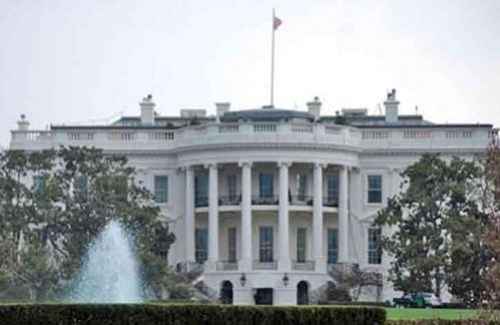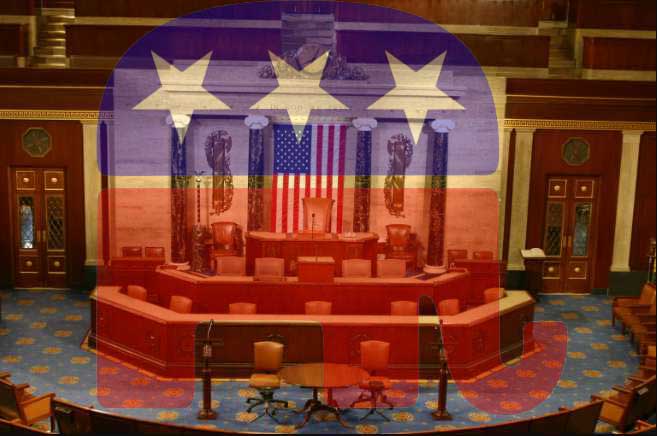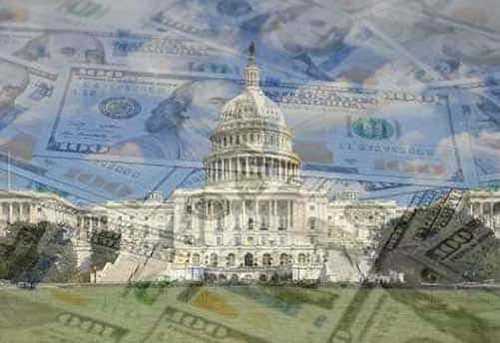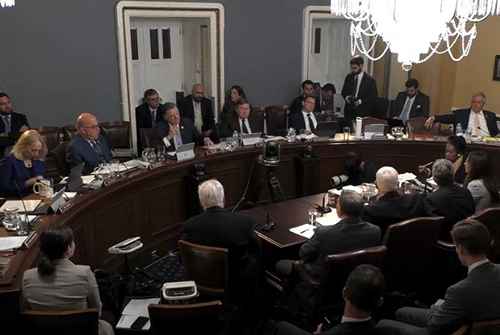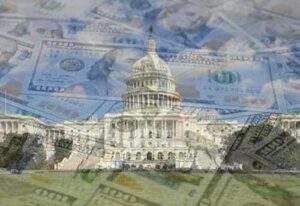 “MAGA Republicans don’t give a damn about the deficit, and today’s estimate of the cost of kickbacks for their friends and donors is further proof,” said Senate Budget Committee Chair Sheldon Whitehouse.
“MAGA Republicans don’t give a damn about the deficit, and today’s estimate of the cost of kickbacks for their friends and donors is further proof,” said Senate Budget Committee Chair Sheldon Whitehouse.
While congressional Republicans hold the global economy hostage by refusing to raise the U.S. debt ceiling without major spending cuts that would hurt the working class, a federal analysis revealed Tuesday that GOP plans to extend tax 2017 breaks for the wealthy could add nearly $3.5 trillion to the nation’s deficit.
The relevant section of the new Congressional Budget Office (CBO) report focuses on the potential extensions of policies from the Tax Cuts and Jobs Act (TCJA), which Republican lawmakers passed and then-President Donald Trump signed in late 2017.
Just extending the TCJA’s changes to individual income tax provisions would cost almost $2.5 trillion through 2033, according to the CBO and Joint Committee on Taxation. Debt service costs would tack on another $278 billion.
If three other policies—higher estate and gift tax exemptions, changes to the tax treatment of investment costs, and certain business tax provisions—are extended plus debt service costs are included, the total hits nearly $3.5 trillion.
“MAGA Republicans don’t give a damn about the deficit, and today’s estimate of the cost of kickbacks for their friends and donors is further proof,” said Senate Budget Committee Chair Sheldon Whitehouse (D-R.I.). “Republicans racked up the national debt by giving tax breaks to their billionaire buddies, and now they want everyone else to pay for them. It is one of life’s great enigmas that Republicans can keep a straight face while they simultaneously cite the deficit to extort massive spending cuts to critical programs and support a bill that would blow up deficits to extend trillions in tax cuts for the people who need them the least.”
“Republicans who say they’re worried about the deficit have brought our economy on the brink of default, and yet they want to run up the debt by locking in the Trump tax law that remains horribly skewed toward corporations and the wealthy.”
Whitehouse and Senate Finance Committee Chair Ron Wyden (D-Ore.) requested the report. Wyden said Tuesday that “$3.5 trillion is an eye-popping long-term price tag for the Trump tax law that Republicans swore up and down would pay for itself.”
“Republicans who say they’re worried about the deficit have brought our economy on the brink of default, and yet they want to run up the debt by locking in the Trump tax law that remains horribly skewed toward corporations and the wealthy,” he added. “The Republican game plan is clear. For every penny they give in tax handouts to the rich, down the road they’re going to demand equivalent cuts that boot people off their health care, increase child hunger, and raise the cost of living for typical Americans.”
After economist Marc Goldwein noted the $3.5 trillion figure and a relevant graph from the report on Twitter, the U.S. House Committee on Ways and Means Democrats tweeted an apparent dig at their GOP colleagues: “This doesn’t sound very fiscally responsible to us.”
House Speaker Kevin McCarthy (R-Calif.) has said that the so-called Limit, Save, Grow Act (H.R. 2811), which the chamber’s Republicans passed last month, “puts us on a fiscally responsible path.” The bill would raise the debt ceiling by $1.5 trillion or until March 31, 2024, whichever comes first, but also impose severe spending cuts.
McCarthy and other congressional leaders met with President Joe Biden at the White House Tuesday afternoon, and pressure for a resolution is mounting, with Treasury Secretary Janet Yellen and other experts projecting that the U.S. could face its first-ever default as early as June 1.
While Biden—whose March budget blueprint called for major social investments along with tax hikes targeting rich individuals and corporations—has publicly insisted on a clean debt limit hike, fears are growing that he’ll cave to GOP lawmakers’ demands to prevent a default, which economists warn would be catastrophic for the global economy.
The Limit, Save, Grow Act does not include TCJA extensions, but it would repeal billions of dollars in Inflation Reduction Act funding for the Internal Revenue Service (IRS) to crack down on rich tax cheats, which the CBO warned last month could increase the deficit by $120 billion over the next decade.
In a Washington Post opinion piece on Tuesday, economists Natasha Sarin and Mark Mazur explained the true cost could be far higher:
In new work, we estimate how much additional revenue the IRS is likely to collect as a result of the extra funding and, conversely, how much revenue would be lost if House Republicans’ proposal became law. We conclude, very conservatively, that the additional funding would shrink the tax gap (the difference between taxes owed and taxes collected) by nearly $500 billion over the next 10 years—and about $1.5 trillion over the course of the next two decades. Without this funding, federal budget deficits would increase by approximately this amount.
What drives the differences between our estimates and official government estimates? We were both engaged with these issues as Treasury Department officials during the period that the Biden administration was making the case for adequately funding the IRS (Mazur as acting assistant secretary for tax policy, Sarin as Treasury’s counselor for tax policy and implementation). So, we saw firsthand the ways that the impact of additional investment in the IRS is underestimated or even ignored by government estimators.
In other words, the pair argued, “House Republicans’ newfound fiscal responsibility isn’t all it’s cracked up to be: Their debt ceiling demands include a proposal that will balloon the debt—and by much more than previously understood.”
Linking to their Post piece, Rep. Emanuel Cleaver (D-Mo.) similarly tweeted that Republicans “don’t care about ‘fiscal responsibility.’ They want to force extreme cuts to veterans’ benefits, nutrition assistance for seniors and kids, and affordable housing programs—all so they can continue to cut taxes for the wealthy and well-connected.”
As Institute on Taxation and Economic Policy federal policy analyst Joe Hughes highlighted in a blog post earlier this month, rescinding the IRS funds isn’t the only way Republicans in Congress plan to serve their superrich benefactors—the GOP is also working to extend 2017 tax cuts.
U.S. Rep. Vern Buchanan (R-Fla.) in February introduced the TCJA Permanency Act (H.R. 976), which “would dramatically increase deficits and would primarily benefit the richest Americans,” Hughes wrote, noting that the bill’s sponsor is “one of the wealthiest members of Congress.”
As he detailed:
The top 5% would receive $112.6 billion in tax cuts in the first year, more than the entire bottom 80%. Under this plan, the richest 1% would save nearly $26,000 on their taxes on average.
When Republicans passed the 2017 tax law, many of its provisions were set to expire at the end of 2025. The lawmakers who wrote the bill didn’t actually want those provisions to expire, but they needed to make their bill appear less costly than it actually was so they structured them as temporary measures that they could later extend. (Even as enacted without extension of the temporary provisions, the bill was enormously expensive, increasing deficits by $1.5 trillion.)
When the permanent and temporary provisions of the bill are taken together, its effects are massively tilted toward the rich. The top 1% will receive a benefit of more than $37,000 in 2026 while the bottom 20% will pay more on average. This is an entirely unreasonable proposal for so-called “budget hawks” to put forth in the middle of a conversation about lowering public debt.
“Astoundingly, this is not the only wasteful tax cut proposal floating around House GOP chambers,” Hughes continued, citing Roll Call. “Republican tax writers are readying a separate package of tax breaks for big businesses. This package looks to be mostly a refurbishment of a plan that failed to pass at the end of last Congress, largely because Democrats would only get on board if it included support for low-income children.”
Roll Callreported in late April that “the bill would revive three tax benefits for businesses that lapsed or began to phase down under the GOP’s 2017 tax law, which Republicans have been eager to extend. Tax writers are still working on the package, but it could include a broader set of provisions.”
The outlet added that “Republicans are aiming to unveil the legislation in May or June, according to a source familiar with the discussions, though it wasn’t immediately clear how quickly it would reach the floor.”
Democrats control not only the White House but also the Senate, though tax cuts passed under former Republican President George W. Bush were made permanent with bipartisan support. As Bobby Kogan, senior director of federal budget policy at the Center for American Progress, recently pointed out, “If not for the Bush tax cuts and their extensions—as well as the Trump tax cuts—revenues would be on track to keep pace with spending indefinitely, and the debt ratio (debt as a percentage of the economy) would be declining.”
“Instead, these tax cuts have added $10 trillion to the debt since their enactment and are responsible for 57% of the increase in the debt ratio since 2001, and more than 90% of the increase in the debt ratio if the one-time costs of bills responding to Covid-19 and the Great Recession are excluded,” Kogan wrote. “Eventually, the tax cuts are projected to grow to more than 100% of the increase.”
Common Dream’s work is licensed under a Creative Commons Attribution-Share Alike 3.0 License. Feel free to republish and share widely.
[content id=”79272″]



